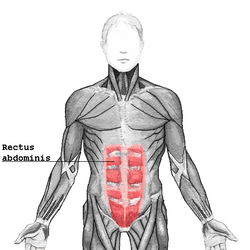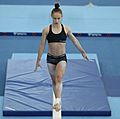Rectus abdominis muscle facts for kids
Quick facts for kids Rectus abdominis |
|
|---|---|
 |
|
| The human rectus abdominis muscle. | |
| Latin | musculus rectus abdominis |
| Artery | inferior epigastric artery |
| Nerve | segmentally by thoraco-abdominal nerves (T7 to T11) and subcostal (T12) |
The rectus abdominis muscle is also known as the "abdominal muscle" or "abs". It is a pair of muscles that run straight up and down on the front of your belly. You have two of these muscles, one on each side. They are separated by a strong band of tissue in the middle called the linea alba.
These muscles stretch from your hip bones (the pubic symphysis, pubic crest, and pubic tubercle) all the way up to your lower ribs (ribs V to VII) and the bottom of your breastbone (the xiphoid process).
The rectus abdominis muscles are held in place by a strong covering called the rectus sheath. This sheath is made from the tough tissues of other belly muscles. Inside the rectus abdominis, there are bands of strong tissue called tendinous intersections. These bands divide the muscle into sections. When people have low body fat, these sections can be seen on the outside. This is what people mean when they talk about a "four-pack", "six-pack", or "eight-pack" of abs. A "six-pack" is the most common to see.
What the Rectus Abdominis Does
The main job of your rectus abdominis muscles is to help you bend forward. Think about doing a sit-up or crunch! These muscles pull your rib cage closer to your hips. They also help keep your internal organs safe inside your belly.
How it Looks
The rectus abdominis is a long, flat muscle. It runs along the entire front of your abdomen. The linea alba is the line of tissue that separates the two rectus abdominis muscles down the middle.
The tendinous intersections divide each rectus abdominis muscle into smaller sections. When you tighten these muscles, they bulge out between these bands. This is what creates the visible "six-pack" or "eight-pack" look in people with low body fat.
The upper part of the muscle connects mainly to the cartilage of your fifth rib. Some fibers also attach directly to the rib itself.
Size of the Muscle
The rectus abdominis muscle is usually about 10 millimeters (about 0.4 inches) thick. This is compared to about 20 millimeters (0.8 inches) of fat on top of it. In young athletes, like handball players, it can be thicker, around 20 millimeters.
The total size (volume) of the muscle is about 300 cubic centimeters in people who are not very active. For athletes, like tennis players, it can be much larger, almost 500 cubic centimeters.
Images for kids
-
Gymnast Félix Dolci, who has a visible rectus abdominis
See also
 In Spanish: Músculo recto abdominal para niños
In Spanish: Músculo recto abdominal para niños
 | Anna J. Cooper |
 | Mary McLeod Bethune |
 | Lillie Mae Bradford |




